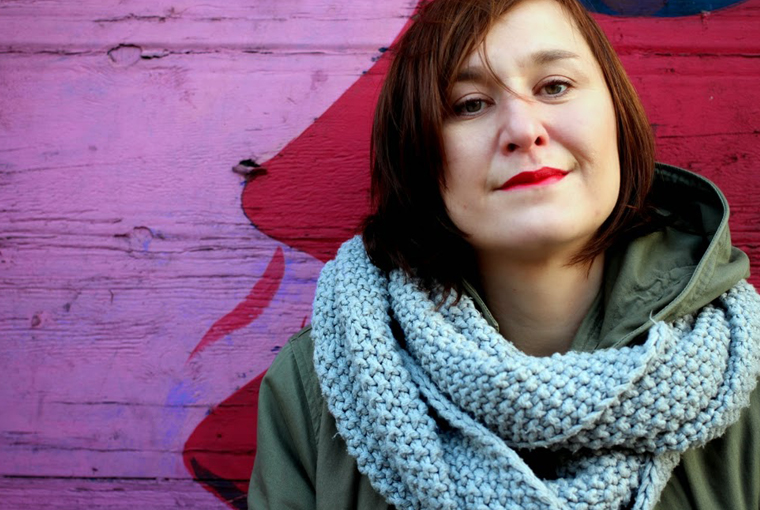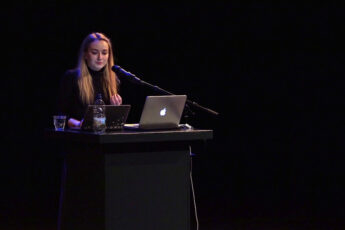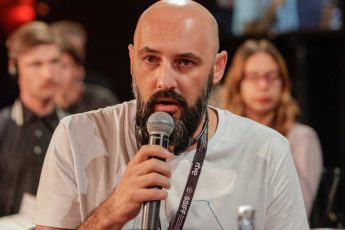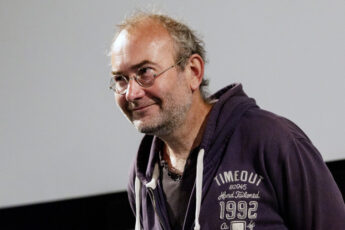
Julia Zelman met Katarzyna Klimkiewicz, director of “Flying Blind”, during the Cottbus Film Festival to speak to her about her career and making films in Poland.
I saw you went to Łódź Film School. What was your experience like there?
It’s a very intense school. I was quite young when I got there; it was just after secondary school. I was the youngest student at 18. I was a bit lost for the first years, it was really tough, this kind of East European professional approach. They really beat you with a stick! (Laughs) You’re never good enough. So after three days I was quite depressed. I completely lost interest. I wasn’t sure why I wanted to make films and I had lost all the fun of it. I thought I needed to have a break. In the end I went on an exchange program to Northern Film School in Leeds. It was much more relaxed and I had more time to breathe.
After that I spent one more year at Łódź Film School. I think the Polish film school system is very good, but it’s very intense. If you’re very sensitive and maybe not very grown up, you can really lose it. I felt like I needed a few more years to really grow up. I worked in television for some time. I did interviews with writers and directors. It was quite fun. For me, it was like a secondary education. I traveled a lot doing reportages about cultural events. After three years I thought, “Okay, I want to make films.” I went to the Binger Film Lab in Amsterdam which is a really good place to develop a story. I wrote a screenplay that in the end didn’t get made, but it was still a turning point in my career. After being there I felt , “Okay, now I know what I want to do.” So that was the end of my formal education, although when you make films you’re learning whatever you do.
The first film you made was a documentary [“Wasserschlacht: The Great Border Battle“, 2007].
It’s hard to say what was my first film, because I started making films when I was a teenager. When I was in secondary school, I was making videos. My very first one was me and my friends filming each other. But I did mostly documentaries after school. My first fiction film was Hanoi-Warsaw, a half-hour film. It was screened here in [Filmfestival] Cottbus three years ago. It won the best short film award at the European Film Awards [2010] for an “Equal Rights” category because it’s about a Vietnamese woman who comes to Poland.
You said at the Q&A that filmmakers have a responsibility to make political films. Is that something you’ve felt from an early age?
I don’t know if I’ve always felt that way, but at some point… I grew up in Poland during a period of change, and I remember the experience of it as a closed country. I remember this feeling when everyone wanted to leave the country and part of my family emigrated, a sense of despair of depression, and a sense that this is a place where nobody wants to live. Now, Poland has become an attractive place. It still has a lot of problems and there are still a lot of people who emigrate, but in general, there’s a sense of freedom. You can do whatever you want with your life. You can go wherever you want. I was especially lucky to be in this social group who profited from this change. Not everybody did.
So now I feel like I have the obligation to support people who were not so lucky: people in these countries that are “behind the wall,” like Poland was. I think I understand this feeling: you want to break free and go to a different country and live life the way you want.
I lived in the Dark Ages, and now we have moved to a better place. I’m not naïve in believing I can change the world, but at least I can remind people that we were responsible for the way this world looks. We can change things. Small things.
Is that something that was a motivation behind “Flying Blind”?
It was. Because these two characters, I could identify with both of them. Of course, I understand Frankie, because she is a strong independent woman in a man’s world. And if you are a woman director, which can still be considered a masculine profession, you have to confront prejudice and what it means to be a woman. But I also understand Kahil: what it could be like to be an illegal immigrant, where you cannot reveal everything about yourself and you don’t know whom you can trust, but there’s also this factor of dignity. You don’t want anybody’s pity. You would not want to tell people that you have a problem.
I wanted to show that it’s hard to connect. Even if you have this connection, even an intimate passion, the conditions that you grew up with influence you. My hope is that everyone watching this film will start confronting their own prejudices.
You hit right on something that’s really important now: the way we see young Arab reformers and student activists. We can’t seem to decide whether they’re on the side of the fundamentalists or on the side of democracy, and we have this very rigid way of categorizing them.
Yes, simplified, because we want a simpler world, and the information that comes to us is already filtered and simplified. So many conflicts come from ignorance.
On a more practical level, did the fact that you studied in Leeds help you to get the gig?
No, I came to screen my short film at a really good festival in Bristol called Encounters. I was approached by a producer named Alison Sterling, who saw it and liked it a lot. She was looking for a director for this project which already had a writer. So she came to me at a party and said, “I loved your film. What do you think of this project?” And I said, “I like it.” It was really as simple as that. It was a good connection, and we’ll work together on our next project.
You had said at the Q&A that you’re developing a project on medieval Poland, “Hungry”, right?
There are a couple of projects I’m developing. There’s the one I’m writing myself on medieval Poland. I don’t have a producer attached to that yet, because it’s a very complex story and I want to have the freedom to develop it the way I want. In my experience, sometimes, if you have producers early, that might not be such a good thing. You’re working under pressure; they want to have a deadline, they want to keep things moving. Sometimes I just don’t want to be rushed. I got some funding for writing from the Polish Film institute, so I can do it on my own and then present it to producers when I’m finished.
But I’m also doing Unity Penfold, an adaptation of a book by British author Margaret Tabor from the 1980s. It’s a story about a 30-year-old woman who one day comes back home and finds that her home has disappeared. There’s no trace of her family and no one recognizes her. She ends up in a mental hospital and is recognized as someone else. At some point she’s forced to assume this other person’s life. It’s a surreal story about identity and dreams. There’s no proof that she has this life: the only proofs are her memories. It’s still in the early stages so I probably shouldn’t talk about it too much.
And there’s one more thing, something my friend is writing for me; kind of a political, contemporary story about young people who can only get shitty jobs and are so disappointed by the promise that if you study and you work hard, you prosper. They cannot move out of their parents’ houses and they’re kind of stuck.
Is this a Polish production?
Yes. I’m developing a couple of things because you have to cover your bases. It’s not too healthy to focus on one project, because it can get completely destroyed, or it can take so many years to do.
You did an interview with the Guardian a couple of years ago, in which you remarked that the funding for Polish film was too centralized. Has that changed at all?
A little bit, there are more local funds. But they can only support you if you have the major funds, which in Poland come from the Polish Institute. If you don’t get the funding from there, it’s really hard to find enough money to produce it elsewhere. All the other institutions can be co-producers, but the major financing comes from one institution. So it is hard, especially for arthouse films. But even more, commercial projects often don’t get the funding. Even films that are more like products designed to make money…
I think it is a problem. It’s hard to discuss what is good. In England, it’s not so centralized. There are more sources of funding. But the market is much stronger, and there’s a demand to make money. So I don’t know if there’s a perfect solution. I think it’s working quite well in Poland. It’s just such hard work! How many films are produced and never go to the big screen? It’s sad. There are so many films no one’s ever going to see.
You can’t think about it too hard.
No, you can’t.
Thank you for the interview.




Leave a Comment